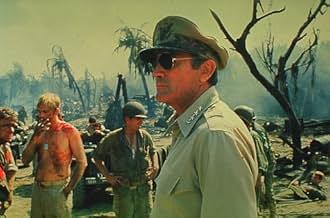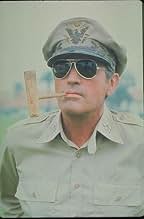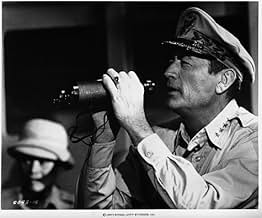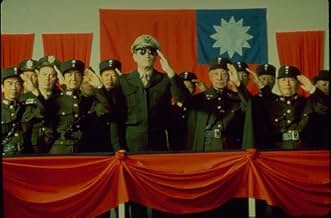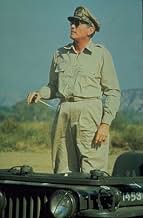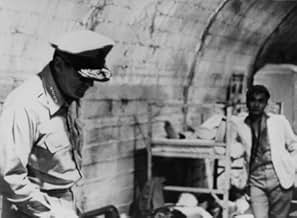CALIFICACIÓN DE IMDb
6.5/10
5.5 k
TU CALIFICACIÓN
Biopic del general Douglas MacArthur sobre sus hazañas bélicas durante la Segunda Guerra Mundial y la guerra de Corea.Biopic del general Douglas MacArthur sobre sus hazañas bélicas durante la Segunda Guerra Mundial y la guerra de Corea.Biopic del general Douglas MacArthur sobre sus hazañas bélicas durante la Segunda Guerra Mundial y la guerra de Corea.
- Dirección
- Guionistas
- Elenco
- Premios
- 2 nominaciones en total
Russell Johnson
- Admiral King
- (as Russell D. Johnson)
- Dirección
- Guionistas
- Todo el elenco y el equipo
- Producción, taquilla y más en IMDbPro
Opiniones destacadas
No matter what you have to say about MacArthur, critical or otherwise, he shaped events in the Pacific theater of World War II to give him a part of history in the twentieth century. In this well done production with Gregory Peck in the leading role, he gives a candid performance of the flamboyant and publicity seeking authoritative General who turned earlier defeat into ultimate victory. His great speech on arrival from the Phillipines, by train at Spencer Street Station in Melbourne Australia in March 1942 incorporating those famous words - " I came through and I shall return" - was an inspiration to many Australians during their darkest hour.
From the time of his arrival in our country he quickly abandoned the idea of defending any mainland invasion by the Japanese and decided on an offensive in New Guinea as a counter attack. Peck is perfect in the role of the self minded MacArthur doggedly pursuing the Japanese back to their homeland while arguing with his own superiors, including U.S. President Franklin D. Roosevelt over his earlier promise to liberate the Phillipines, which was planned to be bypassed. After the Japanese surrender, MacArthur becomes virtual ruler of Japan modifying old customs and instituting sweeping land reforms. His authority remained absolute until the outbreak of the Korean War in 1950, when he clashed with new U.S. President Harry Truman over his successful campaign against the North Koreans and his intention to take on their Communist Chinese backers. Truman, wanting to avoid another world conflict, relieves MacArthur of his command and he is recalled home. Peck is magnificent with his captivating speech before a band of West Point recruits where he details his life and closes the movie with that famous caption " Old soldiers never die - they just fade away". This movie is a must for the younger generation of this world, to know that today's freedom was the result of the sacrifices made by their forbears.
To add a final footnote my mother worked at Archerfield aerodrome in Brisbane in 1942 with her sister where they were employed as aircraft riveter's being responsible for the repair of the fuselage of damaged U.S. Aircraft used during the defense of our country during World War 2. She told me well before her death in March 2004 how she took her limited time off from work to travel to central Brisbane just to watch General MacArthur walk down Queen Street from his home base at Lennons Hotel to the AMP building in Edward Street where he had his headquarters.
She said what a fine figure he cut, tall and handsome, and full of confidence in his goal of supreme victory. Her expectations in the faith of this great American General were ultimately justified. We are a free country today for the contribution of his great military expertise in the time of our greatest need.
From the time of his arrival in our country he quickly abandoned the idea of defending any mainland invasion by the Japanese and decided on an offensive in New Guinea as a counter attack. Peck is perfect in the role of the self minded MacArthur doggedly pursuing the Japanese back to their homeland while arguing with his own superiors, including U.S. President Franklin D. Roosevelt over his earlier promise to liberate the Phillipines, which was planned to be bypassed. After the Japanese surrender, MacArthur becomes virtual ruler of Japan modifying old customs and instituting sweeping land reforms. His authority remained absolute until the outbreak of the Korean War in 1950, when he clashed with new U.S. President Harry Truman over his successful campaign against the North Koreans and his intention to take on their Communist Chinese backers. Truman, wanting to avoid another world conflict, relieves MacArthur of his command and he is recalled home. Peck is magnificent with his captivating speech before a band of West Point recruits where he details his life and closes the movie with that famous caption " Old soldiers never die - they just fade away". This movie is a must for the younger generation of this world, to know that today's freedom was the result of the sacrifices made by their forbears.
To add a final footnote my mother worked at Archerfield aerodrome in Brisbane in 1942 with her sister where they were employed as aircraft riveter's being responsible for the repair of the fuselage of damaged U.S. Aircraft used during the defense of our country during World War 2. She told me well before her death in March 2004 how she took her limited time off from work to travel to central Brisbane just to watch General MacArthur walk down Queen Street from his home base at Lennons Hotel to the AMP building in Edward Street where he had his headquarters.
She said what a fine figure he cut, tall and handsome, and full of confidence in his goal of supreme victory. Her expectations in the faith of this great American General were ultimately justified. We are a free country today for the contribution of his great military expertise in the time of our greatest need.
Unlike Patton, Pershing, Grant or Eisenhower, MacArthur is a many sided character and Peck played the part as I believe MacArthur really was. The positive PR version produced by the U.S. Army in the l940's or the negative liberal press version of the l950's are very limited in their understanding of this great man. I have always believed that MacArthur was a turn of the century progressive much like Teddy Roosevelt, at the same time both imperial and caring, who lived past his time into the l960's. His tactical decisions were unmatched by any general in our history. His speeches rival those of William Jennings Bryan or Patrick Henry and I'm sure many wish we could send him and his administrative skills to Iraq to put that mess back together. In the years since his death a small cult has grown up around his memory much like Robert E.Lee and to some his words are almost mystical. He was a major player in one way or another in WWI, the depression, WWII, Korea and if you count his death-bed plea to President Johnson to get our troops out of Vietnam, even the Vietnam War. If you want to stretch things even farther, he can be tied to turn of the century imperialism and the Spanish-American War through his part in the Philippine Insurrection following the Spanish-American War and if you must, the Indian Wars which he experienced as a small boy with his parents. He has been described as a conservative, a liberal, a militant and a pacifist. How could one man be so much a part of the 19th century and believe in war only between individuals(like Custer and Crazy Horse) or as in feudal times yet advocate A-bombing China? He is always described as arrogant and overly dramatic but like Grant he wore a simple 2nd Lieutenant's uniform with five stars on the shoulder minus all the medals that the "G.I. generals" wore. I believe his love for the people of Asia was sincere and in this was he was like Alexander or Caesar. We are fortunate Gregory Peck did play MacArthur as such a complex individual. To focus only on the Five-Star General with the corn-cob pipe is to miss the the big picture. No wonder Patton is so easy to watch compared to MacArthur. I have seen the movie at least 15 times and am still moved by it.
It is noteworthy that mine is only the third review of this film, whereas `Patton- Lust for Glory', producer Frank McCarthy's earlier biography of a controversial American general from the Second World War, has to date attracted nearly a hundred comments. Like a previous reviewer, I am intrigued by why one film should have received so much more attention than the other.
One difference between the two films is that `Patton' is more focused, concentrating on a relatively short period at and immediately after the end of the Second World War, whereas `MacArthur' covers not only this war but also its subject's role in the Korean war, as well as his period as American governor of occupied Japan during the interlude.
The main difference, however, lies in the way the two leaders are played. Gregory Peck dominates this film even more than George C. Scott dominated `Patton'. Whereas Scott had another major star, Karl Malden, playing opposite him as General Bradley, none of the other actors in `MacArthur' are household names, at least for their film work. Scott, of course, portrayed Patton as aggressive and fiery-tempered, a man who at times was at war with the rest of the human race, not just with the enemy. I suspect that in real life General MacArthur was as volcanic an individual as Patton, but that is not how he appears in this film. Peck's MacArthur is of a more reflective, thoughtful bent, comparable to the liberal intellectuals he played in some of his other films. At times, he even seems to be a man of the political left. Much of his speech on the occasion of the Japanese surrender in 1945 could have been written by a paid-up member of CND, and his policies for reforming Japanese society during the American occupation have a semi-socialist air to them. In an attempt to show something of MacArthur's gift for inspiring leadership, Peck makes him a fine speaker, but his speeches always seem to owe more to the studied tricks of the practised rhetorician than to any fire in the heart. It is as if Atticus Finch from `To Kill a Mockingbird' had put on a general's uniform.
Whereas Scott attempted a `warts and all' portrait of Patton, the criticism has been made that `MacArthur' attempts to gloss over some of its subject's less attractive qualities. I think that this criticism is a fair one, particularly as far as the Korean War is concerned. The film gives the impression that MacArthur was a brilliant general who dared stand up to interfering, militarily ignorant politicians who did not know how to fight the war and was sacked for his pains when victory was within his grasp. Many historians, of course, feel that Truman was forced to sack MacArthur because the latter's conduct was becoming a risk to world peace, and had no choice but to accept a stalemate because Stalin would not have allowed his Chinese allies to be humiliated. Even during the Korean scenes, Peck's MacArthur comes across as more idealistic than his real-life original probably was; we see little of his rashness and naivety about political matters. (Truman 's remark `he knows as much about politics as a pig knows about Sunday' was said about Eisenhower, but it could equally well have been applied to MacArthur's approach to international diplomacy). Perhaps the film's attempt to paint out some of MacArthur's warts reflects the period in which it was made. The late seventies, after the twin traumas of Vietnam and Watergate, was a difficult time for America, and a public looking for reassurance might have welcomed a reassuringly heroic depiction of a military figure from the previous generation. Another criticism I would make of the film is that it falls between two stools. If it was intended to be a full biography of MacArthur, something should have been shown of his early life, which is not covered at all. (The first we see of the general is when he is leading the American resistance to the Japanese invasion of the Philippines). One theme that runs throughout the film is the influence of General MacArthur's father, himself a military hero. I would have liked to see what sort of man Arthur MacArthur was, and just why his son considered him to be such a hero and role model. Another interesting way of making the film would have been to concentrate on Korea and on MacArthur's clash with Truman, with equal prominence given to the two men and with actors of similar stature playing them. The way in which the film actually was made seemed to me to be less interesting than either of these alternative approaches.
It would be wrong, however, to give the impression that I disliked the film altogether. Although I may not have agreed with Peck's interpretation of the main role, there is no denying that he played it with his normal professionalism and seriousness. The film as a whole is a good example of a solid, workmanlike biopic, thoughtful and informative. It is a good film, but one that could have been a better one. 7/10.
On a pedantic note, the map which MacArthur is shown using during the Korean War shows the DMZ, the boundary between the two Korean states that did not come into existence until after the war. (The pre-war boundary was the 38th parallel). Also, I think that MacArthur was referring to the `tocsin' of war. War may be toxic, but it is difficult to listen with thirsty ear for a toxin.
One difference between the two films is that `Patton' is more focused, concentrating on a relatively short period at and immediately after the end of the Second World War, whereas `MacArthur' covers not only this war but also its subject's role in the Korean war, as well as his period as American governor of occupied Japan during the interlude.
The main difference, however, lies in the way the two leaders are played. Gregory Peck dominates this film even more than George C. Scott dominated `Patton'. Whereas Scott had another major star, Karl Malden, playing opposite him as General Bradley, none of the other actors in `MacArthur' are household names, at least for their film work. Scott, of course, portrayed Patton as aggressive and fiery-tempered, a man who at times was at war with the rest of the human race, not just with the enemy. I suspect that in real life General MacArthur was as volcanic an individual as Patton, but that is not how he appears in this film. Peck's MacArthur is of a more reflective, thoughtful bent, comparable to the liberal intellectuals he played in some of his other films. At times, he even seems to be a man of the political left. Much of his speech on the occasion of the Japanese surrender in 1945 could have been written by a paid-up member of CND, and his policies for reforming Japanese society during the American occupation have a semi-socialist air to them. In an attempt to show something of MacArthur's gift for inspiring leadership, Peck makes him a fine speaker, but his speeches always seem to owe more to the studied tricks of the practised rhetorician than to any fire in the heart. It is as if Atticus Finch from `To Kill a Mockingbird' had put on a general's uniform.
Whereas Scott attempted a `warts and all' portrait of Patton, the criticism has been made that `MacArthur' attempts to gloss over some of its subject's less attractive qualities. I think that this criticism is a fair one, particularly as far as the Korean War is concerned. The film gives the impression that MacArthur was a brilliant general who dared stand up to interfering, militarily ignorant politicians who did not know how to fight the war and was sacked for his pains when victory was within his grasp. Many historians, of course, feel that Truman was forced to sack MacArthur because the latter's conduct was becoming a risk to world peace, and had no choice but to accept a stalemate because Stalin would not have allowed his Chinese allies to be humiliated. Even during the Korean scenes, Peck's MacArthur comes across as more idealistic than his real-life original probably was; we see little of his rashness and naivety about political matters. (Truman 's remark `he knows as much about politics as a pig knows about Sunday' was said about Eisenhower, but it could equally well have been applied to MacArthur's approach to international diplomacy). Perhaps the film's attempt to paint out some of MacArthur's warts reflects the period in which it was made. The late seventies, after the twin traumas of Vietnam and Watergate, was a difficult time for America, and a public looking for reassurance might have welcomed a reassuringly heroic depiction of a military figure from the previous generation. Another criticism I would make of the film is that it falls between two stools. If it was intended to be a full biography of MacArthur, something should have been shown of his early life, which is not covered at all. (The first we see of the general is when he is leading the American resistance to the Japanese invasion of the Philippines). One theme that runs throughout the film is the influence of General MacArthur's father, himself a military hero. I would have liked to see what sort of man Arthur MacArthur was, and just why his son considered him to be such a hero and role model. Another interesting way of making the film would have been to concentrate on Korea and on MacArthur's clash with Truman, with equal prominence given to the two men and with actors of similar stature playing them. The way in which the film actually was made seemed to me to be less interesting than either of these alternative approaches.
It would be wrong, however, to give the impression that I disliked the film altogether. Although I may not have agreed with Peck's interpretation of the main role, there is no denying that he played it with his normal professionalism and seriousness. The film as a whole is a good example of a solid, workmanlike biopic, thoughtful and informative. It is a good film, but one that could have been a better one. 7/10.
On a pedantic note, the map which MacArthur is shown using during the Korean War shows the DMZ, the boundary between the two Korean states that did not come into existence until after the war. (The pre-war boundary was the 38th parallel). Also, I think that MacArthur was referring to the `tocsin' of war. War may be toxic, but it is difficult to listen with thirsty ear for a toxin.
History buffs will find plenty to quibble with in "MacArthur." Like a lot of World War II movies, it has its share of minor errors. And American military enthusiasts are certain to have strong opinions on Douglas MacArthur already, which will affect their views of the film.
But all in all, I think this is a remarkably balanced look at an extremely controversial person. For those who know little about MacArthur, it's a good place to start. He was a larger-than-life figure, and in this film you can see both why he was revered and why he was despised.
Although MacArthur came of age in the 19th century and became a general in World War I, this movie focuses on his high and lows in World War II and the Korean War. During that time he was an iconic figure. "Iconic" is an overused word, but it applies to him. With his trademark hat and corncob pipe, plus his curiously old-fashioned way of speaking and his instinct for controversy, he was unmistakable and larger than life.
During the late 1970s, the post-Watergate era, traditional war pictures were no longer in vogue. "M*A*S*H," the mildly pacifist TV series set in the Korean War, treated MacArthur as a rather silly figure. But this movie, made in 1977, takes the man seriously, while showing his flaws clearly. It also is more frank than most classic films about how little consensus there is in warmaking. Leaders quarrel and connive while making policy, and the most loyal grunts are often dismayed at the decisions that put them in harm's way.
Gregory Peck is excellent in capturing the complexity of Douglas MacArthur. Peck was an outspoken political liberal, and one has to assume he was no admirer of the unabashedly right-wing MacArthur. But he takes on the man's persona admirably.
After heaping so much praise on "MacArthur," I must admit it is not great cinema. It's more interesting than moving. But if you're under 50 and know Douglas MacArthur only as a name in the history books, this will be an eye-opener. Like any good introduction to a subject, it should encourage you to seek other information and form your own opinions about the man and his times.
But all in all, I think this is a remarkably balanced look at an extremely controversial person. For those who know little about MacArthur, it's a good place to start. He was a larger-than-life figure, and in this film you can see both why he was revered and why he was despised.
Although MacArthur came of age in the 19th century and became a general in World War I, this movie focuses on his high and lows in World War II and the Korean War. During that time he was an iconic figure. "Iconic" is an overused word, but it applies to him. With his trademark hat and corncob pipe, plus his curiously old-fashioned way of speaking and his instinct for controversy, he was unmistakable and larger than life.
During the late 1970s, the post-Watergate era, traditional war pictures were no longer in vogue. "M*A*S*H," the mildly pacifist TV series set in the Korean War, treated MacArthur as a rather silly figure. But this movie, made in 1977, takes the man seriously, while showing his flaws clearly. It also is more frank than most classic films about how little consensus there is in warmaking. Leaders quarrel and connive while making policy, and the most loyal grunts are often dismayed at the decisions that put them in harm's way.
Gregory Peck is excellent in capturing the complexity of Douglas MacArthur. Peck was an outspoken political liberal, and one has to assume he was no admirer of the unabashedly right-wing MacArthur. But he takes on the man's persona admirably.
After heaping so much praise on "MacArthur," I must admit it is not great cinema. It's more interesting than moving. But if you're under 50 and know Douglas MacArthur only as a name in the history books, this will be an eye-opener. Like any good introduction to a subject, it should encourage you to seek other information and form your own opinions about the man and his times.
It is inevitable that MACARTHUR will be compared to PATTON, the other military biopic produced by the late Frank McCarthy. Such comparisons are unfortunate because their subjects are vastly different, albeit controversial figures, and each film takes a different approach in examining their impact on history.
George S. Patton commanded an Army formation in Europe while Douglas Macarthur commanded an entire theater of operation in the Pacific. By his own admission, Patton never had any political ambitions, while MacArthur definitely had such aspirations. Patton's political naivety made him ill-suited as the postwar occupation commander in Bavaria while MacArthur's political astuteness served him well during the occupation of Japan.
Yet both men were great, if iconoclastic military leaders. Patton's brilliant northern pivot during the Battle of the Bulge is matched by the MacArthur's daring amphibious landing at Inchon. And both men believed strongly in their destiny; Patton's belief was based on reincarnation while MacArthur was motivated by following in his illustrious father's footsteps.
Surprisingly, PATTON is the much more succinct, less ambitious film than MACARTHUR. It concentrates on its colorful, mercurial main character during a comparatively brief two-year period between the American defeat at Kasserine Pass in early 1943 to Patton's dismissal prior to his death in late 1945. Although we see Patton's conflict with Omar Bradley, Bernard Montgomery, and Bedell Smith, we never see his interaction with General Dwight Eisenhower, Prime Minister Winston Churchill, or General George Marshall, the U.S. Army's chief of staff.
MACARTHUR is a much more ambitious film, covering nearly a decade from the fall of Bataan in early 1942 to MacArthur's dismissal in 1951. Additionally, MACARTHUR shows a wider range of conflict between MacArthur and such individuals as Admiral Nimitz, General Marshall, ambassador William Averell Harriman, and Presidents Roosevelt and Harry S. Truman.
So, does MACARTHUR match PATTON as a groundbreaking biopic? No, it doesn't.
MACARTHUR lacks the insightful, acerbic screenplay that Francis Ford Coppola and Edmund North supplied PATTON. The direction by TV veteran Joseph Sargent is yeoman-like where the late Franklin J. Schaffner offers a more vigorous, hell-for-leather approach to PATTON. Both films are handsomely mounted productions that serve as a tribute to acumen of the producer McCarthy. Both movies benefit from film scores by the ever-reliable Jerry Goldsmith.
While PATTON has its main character departing in a Valhalla-like denouement, MACARTHUR is book-ended by the legendary speech that the old soldier delivered to the cadet corps at West Point in 1962 as a final valedictory.
At the heart of both films are the extraordinary performances of their lead actors. The late George C. Scott's portrayal of Patton is justly remembered, but Gregory Peck delivers a performance that is both subtle and unapologetic and helps to elevate this often-pedestrian production to a higher level. Peck's portrayal is reminiscent of his work in TWELVE O'CLOCK HIGH, but with the added weight of an additional thirty years of experience and craftsmanship that this great actor brings to bear to this role. Peck is ably supported by Dan O'Herlihy as FDR and the late Ed Flanders as Harry S. Truman.
Finally, I must note the presence of Dr. D. Clayton James, the author of the standard multi-volume biography of MacArthur, who served as this film's technical advisor.
George S. Patton commanded an Army formation in Europe while Douglas Macarthur commanded an entire theater of operation in the Pacific. By his own admission, Patton never had any political ambitions, while MacArthur definitely had such aspirations. Patton's political naivety made him ill-suited as the postwar occupation commander in Bavaria while MacArthur's political astuteness served him well during the occupation of Japan.
Yet both men were great, if iconoclastic military leaders. Patton's brilliant northern pivot during the Battle of the Bulge is matched by the MacArthur's daring amphibious landing at Inchon. And both men believed strongly in their destiny; Patton's belief was based on reincarnation while MacArthur was motivated by following in his illustrious father's footsteps.
Surprisingly, PATTON is the much more succinct, less ambitious film than MACARTHUR. It concentrates on its colorful, mercurial main character during a comparatively brief two-year period between the American defeat at Kasserine Pass in early 1943 to Patton's dismissal prior to his death in late 1945. Although we see Patton's conflict with Omar Bradley, Bernard Montgomery, and Bedell Smith, we never see his interaction with General Dwight Eisenhower, Prime Minister Winston Churchill, or General George Marshall, the U.S. Army's chief of staff.
MACARTHUR is a much more ambitious film, covering nearly a decade from the fall of Bataan in early 1942 to MacArthur's dismissal in 1951. Additionally, MACARTHUR shows a wider range of conflict between MacArthur and such individuals as Admiral Nimitz, General Marshall, ambassador William Averell Harriman, and Presidents Roosevelt and Harry S. Truman.
So, does MACARTHUR match PATTON as a groundbreaking biopic? No, it doesn't.
MACARTHUR lacks the insightful, acerbic screenplay that Francis Ford Coppola and Edmund North supplied PATTON. The direction by TV veteran Joseph Sargent is yeoman-like where the late Franklin J. Schaffner offers a more vigorous, hell-for-leather approach to PATTON. Both films are handsomely mounted productions that serve as a tribute to acumen of the producer McCarthy. Both movies benefit from film scores by the ever-reliable Jerry Goldsmith.
While PATTON has its main character departing in a Valhalla-like denouement, MACARTHUR is book-ended by the legendary speech that the old soldier delivered to the cadet corps at West Point in 1962 as a final valedictory.
At the heart of both films are the extraordinary performances of their lead actors. The late George C. Scott's portrayal of Patton is justly remembered, but Gregory Peck delivers a performance that is both subtle and unapologetic and helps to elevate this often-pedestrian production to a higher level. Peck's portrayal is reminiscent of his work in TWELVE O'CLOCK HIGH, but with the added weight of an additional thirty years of experience and craftsmanship that this great actor brings to bear to this role. Peck is ably supported by Dan O'Herlihy as FDR and the late Ed Flanders as Harry S. Truman.
Finally, I must note the presence of Dr. D. Clayton James, the author of the standard multi-volume biography of MacArthur, who served as this film's technical advisor.
¿Sabías que…?
- TriviaAlthough Gregory Peck had reservations about the film's script and production quality, he later called it one of his favorite roles, if not one of his favorite movies.
- ErroresShortly after MacArthur's escape from the Philippines in the spring of 1942, he complains that the President and the Chiefs of Staff are not sending him enough troops, supplies, and equipment to carry on his war against the Japanese. He says that priorities are instead being given to commanders in other theaters, including Gen Patton in North Africa. However, Patton's troops did not arrive in Africa until November 1942.
- Citas
President Sergio Osmena: You see, General, my people are going to laugh if I fell in deep water. I cannot swim!
General Douglas MacArthur: That's not so bad, Mr. President. Everyone's about to see that I can't walk on water.
- Versiones alternativasThe UK DVD issue omits the sequence where MacArthur meets Emperor Hirohito, but instead, adds to the ending. The film now ends with MacArthur and his wife watch a TV transmission of the presidential inauguration of Eisenhower MacArthur's comment: "He will turn out fine. He was the best clerk that ever served under me"), followed by the end of MacArthur's farewell speech at West Point. The subsequent credits starts to roll slightly earlier than previously.
Selecciones populares
Inicia sesión para calificar y agrega a la lista de videos para obtener recomendaciones personalizadas
- How long is MacArthur?Con tecnología de Alexa
Detalles
- Fecha de lanzamiento
- País de origen
- Idioma
- También se conoce como
- MacArthur - Held des Pazifik
- Locaciones de filmación
- Navy Yard, Bremerton, Washington, Estados Unidos(scenes on USS Missouri)
- Productora
- Ver más créditos de la compañía en IMDbPro
Taquilla
- Presupuesto
- USD 9,000,000 (estimado)
- Tiempo de ejecución2 horas 10 minutos
- Mezcla de sonido
- Relación de aspecto
- 1.85 : 1
Contribuir a esta página
Sugiere una edición o agrega el contenido que falta

